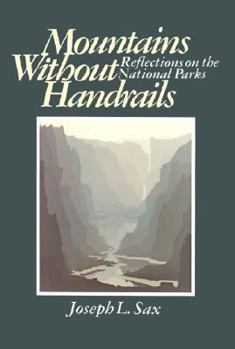Mountains Without Handrails: Reflections on the National Parks
Select Format
Select Condition 
Book Overview
Focusing on the long-standing and bitter battles over recreational use of our national parklands, Joseph L. Sax proposes a novel scheme for the protection and management of America's national parks. Drawing upon the most controversial disputes of recent years---Yosemite National Park, the Colorado River in the Grand Canyon, and the Disney plan for California's Mineral King Valley---Sax boldly unites the rich and diverse tradition of nature writing...
Format:Paperback
Language:English
ISBN:0472063243
ISBN13:9780472063246
Release Date:October 1980
Publisher:University of Michigan Press
Length:160 Pages
Weight:0.53 lbs.
Dimensions:0.5" x 5.3" x 7.9"
Customer Reviews
3 ratings
Mountains Without Handrails
Published by Thriftbooks.com User , 15 years ago
How is one to experience nature, wilderness? Is this in fact a moral question or can it only be a matter of personal preference? The author raises this question (in 1980) in the context of US National Parks, which being public lands, require a management policy that takes account of the public's presence in these parks. Should we preserve the wilderness of these parks without qualification, or should nature be tamed and modified enough to accommodate those who wish to experience wilderness with modern comforts and without the trouble of personal effort and self-determination? Do we need to provide entertainment for these people, give them a structured experience, provide resorts and a rural simulation of that urban environment they ostensibly have come to the wilderness to leave? Should National Parks become grand resorts with nature as a mere backdrop, nature-enhanced amusement parks, or should these parks be managed to limit the incursion of urban life and ready made entertainment? Shouldn't nature be a place where you have to find your own way, discover for yourself what there is to hold your attention, and not be rushed or directed how to respond? If not there, where? What is the place of nature in our lives? Should there be a National policy that preserves nature and allows us to experience it as a true wilderness? Or should we democratize nature, alter it to fit an egalitarian politics?
Reflections on keeping the riff-raff out, even in a democracy
Published by Thriftbooks.com User , 18 years ago
This book is a thoughtful and serious rebuttal to the argument that wilderness preservation is an elitist (even undemocratic) concern. Backpacking, wilderness designations, restrictions on development, and the like all *look* elitist. Backpacking is a pursuit of the educated upper-middle class, which also dominates most environmental groups. The broader working and middle classes want roads, RV campsites, snowmobiles and off-road vehicles, as well as attractive hotels, restaurants, gift shops, swimming pools and other resort activities. Is there a defensible democratic argument for saying "no" to these things? Sax insists that there is. The full argument is too nuanced to summarize here but here's a piece of it. Some people buy season tickets to cultural events because they know that a full season will expose them to things they already like (Mozart for example) as well as things they don't yet know about. People pay for librarians to recommend books we wouldn't otherwise find. Wilderness preservation in our national parks can play an analogous role, introducing motorized visitors to non-motorized things that they wouldn't otherwise experience. Done correctly, visits can force visitors to experience nature with an open-ended agenda. Visitors won't know in advance whether they'll like the experience, but they might know that they're willing to take a chance and trust the Park Service. Sax makes many interesting points about national parks and wilderness along the way. Like most others writing in this genre, he is also very critical of the tourism-related development that characterizes most national parks. This book is not the place to go if you're looking for a history of the parks (or if you're looking for any factual material), but if you'd like thoughtful reflections on the parks in a series of essays, I strongly recommend it.
A timely reminder, even 20 years later
Published by Thriftbooks.com User , 24 years ago
Joseph Sax does an eloquent job of retracing the history of national parks with an emphasis on the differences between what was intended and what has been implemented. He writes not only of how our reserved lands are viewed, but also about how different sectors of the population believe these lands should be used (or not). What is particularly effective are his discourses on the different populations and the feedback effect We have on shaping policy for reserve lands. This is a very interesting book that anyone who considers themselves to be an "advocate" of wilderness or of the idea of the outdoors, would do well to read.






